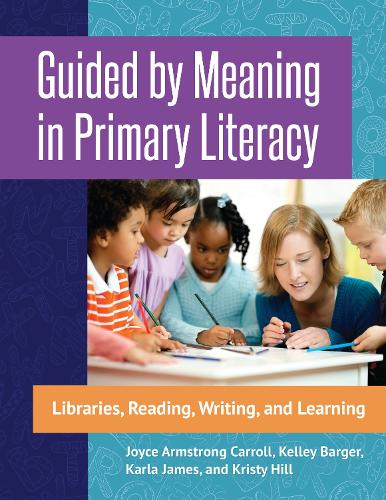
Guided by Meaning in Primary Literacy: Libraries, Reading, Writing, and Learning
(Paperback)
Publishing Details
Guided by Meaning in Primary Literacy: Libraries, Reading, Writing, and Learning
By (Author) Joyce Armstrong Carroll
By (author) Kelley Barger
By (author) Karla James
By (author) Kristy Hill
Bloomsbury Publishing PLC
Libraries Unlimited Inc
12th December 2016
United States
Classifications
Professional and Scholarly
Non Fiction
027.625
Physical Properties
Paperback
320
Width 216mm, Height 279mm
964g
Description
Using a research-based approach, this book examines the critical connections between writing and reading, and it explains how to encourage early literacy in the classroom and library. How can teachers and librarians support true literacy in young learners Are very young children guided by meaning in constructing their reality and their relationship to the world What is the value of championing writing at the kindergarten level Guided by Meaning in Primary Literacy: Libraries, Reading, Writing, and Learning answers these questions and many more, providing best practices in early literacy through explicit lessons in writing and reading and demonstrating how the library can extend learning in deep and powerful ways. While some books emphasize reading, others emphasize writing, and still others focus on library instruction, this profound resource brings all of the components of literacy together in a meaningful way. Throughout the book, the authors highlight examples of student writing, anecdotes from the real world, and connections between theory and what happens in practical application. Unique in its thoroughness of content for this age group, this text is essential reading for all early childhood teachers and librarians working in schools and in public libraries with young children. The book also serves trainers working with teachers and librarians to increase their effectiveness in working with young children to promote early literacy.
Reviews
This manual makes a compelling case for writing as an important facet of children's library experiences. . . . Experienced teacher librarians will appreciate the workable advice to be found in this title. * Choice *
A practical and important book on supporting early literacy in schools and libraries with lessons in writing and reading. The title's most crucial arguments are that literacy (and, for that matter, anything) should resonate with those we teach and that 'brain research has supported meaningful instruction for decades and continues to support it by proving that the brain neither attends nor retains what it perceives as meaningless'a powerful statement backed up by research. The authors are successful in demonstrating how libraries can extend learning in deep and powerful ways. They highlight examples of student writing anecdotes from the real world and make connections between theory and practical application. While the text is grounded in research, Carroll, Barger, James, and Hill don't neglect to present lessons and stories that reflect the true joy of reading and how magical early literacy activities can be for young children. VERDICT A must-read for early childhood educators. * School Library Journal *
Teachers of children in first to second grades will find this handbook meaningful and liberating, and librarians can offer this book as an excellent reference. Recommended. * School Library Connection *
Author Bio
Joyce Armstrong Carroll, EDD, HLD, codirector of Abydos Literacy Learning, is the author of more than 20 professional books and more than 50 professional articles. Kelley Barger, EDD, is professor and director of reading programs at Fontbonne University, St. Louis, MO. Karla James is an educator with 15 years of experience with the Alvin Independent School District in Texas. Kristy Hill, MLS, is a library media technology specialist for Keller Independent School District, Keller, TX.
